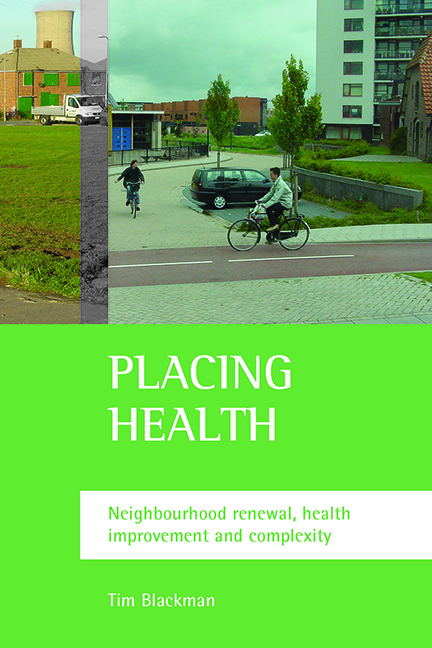Book contents
- Frontmatter
- Dedication
- Contents
- List of tables and figures
- Acknowledgements
- List of abbreviations
- Preface
- one Policy and places
- two Health, neighbourhoods and complexity
- three Emergence and environment press
- four The neighbourhood effect
- five Neighbourhood renewal and health inequalities
- six Health inequality as a policy priority
- seven Conclusion: neighbourhoods in the wider picture
- References
- Index
- Also available from The Policy Press
five - Neighbourhood renewal and health inequalities
Published online by Cambridge University Press: 18 January 2022
- Frontmatter
- Dedication
- Contents
- List of tables and figures
- Acknowledgements
- List of abbreviations
- Preface
- one Policy and places
- two Health, neighbourhoods and complexity
- three Emergence and environment press
- four The neighbourhood effect
- five Neighbourhood renewal and health inequalities
- six Health inequality as a policy priority
- seven Conclusion: neighbourhoods in the wider picture
- References
- Index
- Also available from The Policy Press
Summary
Lupton (2003, p 1) comments that, ‘Rarely has the neighbourhood enjoyed as high a profile in public policy as it does today’. She continues with a list of the many area-based initiatives (ABIs) introduced by Labour governments since 1997. In England, the focus on neighbourhoods in strategies to tackle deprivation has mainly been concerned with improving the delivery of public services in deprived areas so as to achieve measurable improvements in key outcomes across health, employment, education, housing and crime. Similar approaches exist in Scotland, Wales and Northern Ireland, but currently with less emphasis on performance assessment and management. While there are substantial additional resources for these programmes, they also emphasise news ways of working that promote partnerships and community engagement.
Neighbourhood renewal: its targets and performance
England's National Strategy for Neighbourhood Renewal was launched in 2001. It is one of the most significant of a wide range of social policy initiatives launched by the New Labour government after the Conservatives were defeated in 1997, and which has included both ABIs and national programmes such as the drive to eliminate child poverty (HM Treasury, 2005). The programme was shaped by a series of reports from 18 Policy Action Teams, which concluded that past initiatives had failed sufficiently to tackle the problems of depressed local economies and the safety and stability of local communities, or to improve public services for the most disadvantaged residents and involve residents in decisions affecting them (SEU, 2001). They also crucially lacked effective local leadership, partnership working and information.
These last issues reflect the wider shift in public policy that has been occurring under New Labour, and indeed began earlier in the 1990s under the Conservatives. This has been away from government through blueprint and direct service delivery dominated by public sector professionals, and towards governance through networks that bring different public, private and voluntary/community actors together to agree, plan and deliver programmes that often cross organisational boundaries (Stoker, 1998; Kooiman, 2003). This is an agenda that is very much about achieving the delivery of measurable outcomes (hence the emphasis on information), but not prescribing in detail organisational arrangements on the ground. The emphasis is on working differently, and tackling joined-up problems with joined-up solutions (Cabinet Office, 1999). Local actors are given space and incentives to realise the policy intent from the centre by developing the concrete organisational arrangements locally.
- Type
- Chapter
- Information
- Placing HealthNeighbourhood Renewal, Health Improvement and Complexity, pp. 109 - 140Publisher: Bristol University PressPrint publication year: 2006



